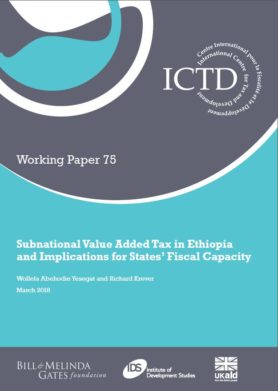ICTD Working Paper 75
In most federal systems, state governments are funded through a combination of direct fiscal transfers from the central government, and the revenue they collect directly from locally adopted taxes. Ethiopia is a federal polity, but follows a slightly different path in the case of its most important tax source – value added tax (VAT). As is the case in many developing countries, VAT is a major source of government revenue in Ethiopia, and the tax is levied under central government legislation. However, unlike the more common practice of a central government collecting VAT and then earmarking some of the revenue for transfer to states, collection rights and administration powers over VAT imposed on a portion of the economy in Ethiopia are assigned directly to state governments. The result is a fiscal relationship between central and state governments in Ethiopia that is distinctive in three main respects.
